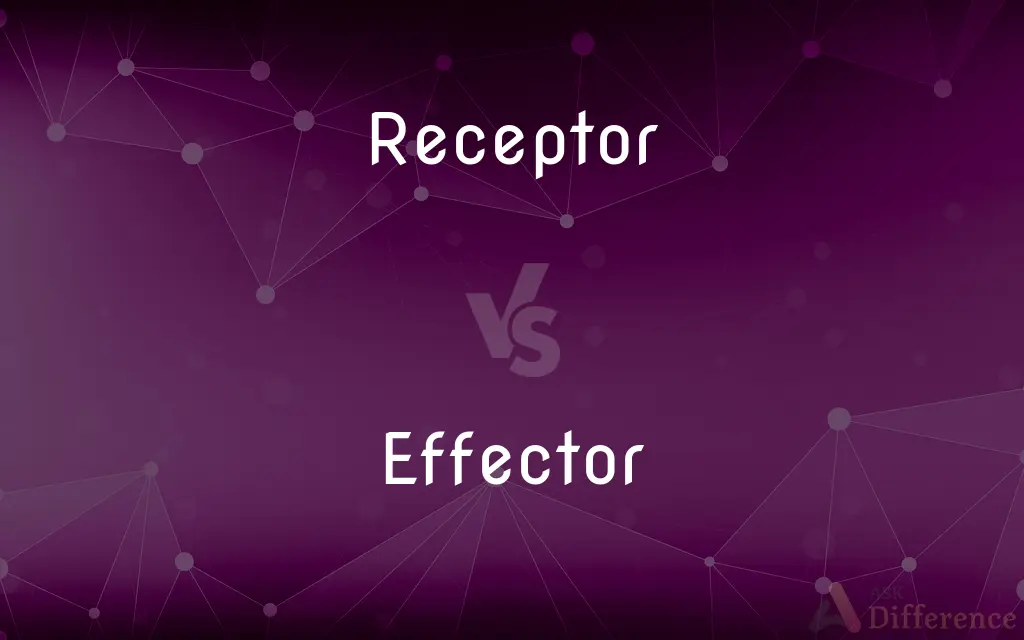Receptor vs. Effector — What's the Difference?
By Tayyaba Rehman — Updated on October 5, 2023
Receptors detect stimuli or signals. Effectors enact a response based on those signals.

Difference Between Receptor and Effector
Table of Contents
ADVERTISEMENT
Key Differences
Receptors are specialized cells or molecules that recognize and bind to specific stimuli or signals. Effectors, conversely, are cells or organs that produce a response after receiving information from receptors.
In the realm of physiology, a receptor can be a nerve ending sensitive to stimuli such as light, heat, or pressure. In contrast, an effector may be a muscle or gland carrying out an action in response to the information received.
At the molecular level, a receptor can be a protein on a cell surface that binds specific molecules, like hormones. However, the effector in this context could be an enzyme catalyzing a reaction inside the cell after activation by the receptor.
In many body systems, the receptor acts as the initial point of contact with external or internal changes. The effector then plays its role, often bringing about a change to counteract or adapt to the stimulus.
While receptors gather information and are pivotal for sensing, effectors implement actions. Thus, receptors and effectors are complementary, ensuring the body responds appropriately to its environment.
ADVERTISEMENT
Comparison Chart
Role
Detects stimuli or signals.
Executes a response to stimuli or signals.
Examples in Physiology
Nerve endings, sensory cells.
Muscles, glands.
Examples at Molecular
Proteins binding hormones or neurotransmitters.
Enzymes catalyzing reactions.
Interaction
Receives or recognizes information.
Acts upon the received information.
Relationship
Initial point of contact with stimuli.
Executes action based on receptor's information.
Compare with Definitions
Receptor
Receptor can be an organ sensitive to external stimuli.
The skin is a receptor for touch and temperature.
Effector
Effector is a cell or organ that acts in response to a stimulus.
Muscles contract as an effector response to nerve signals.
Receptor
Receptor refers to a protein that binds specific molecules.
Insulin binds to its receptor on the cell surface.
Effector
Effector is an entity that enacts a specific action or function.
The robot's arm was an effector in the assembly line.
Receptor
Receptor is an entity that receives signals or messages.
The satellite acts as a receptor for transmission signals.
Effector
Effector denotes something that produces an effect or result.
The switch served as an effector, illuminating the room.
Receptor
Receptor is a cell or group of cells specialized to detect specific stimuli.
The eye contains light-sensitive receptors.
Effector
Effector refers to a molecule that activates an enzyme.
Certain molecules act as an effector to speed up enzyme reactions.
Receptor
(Physiology) A specialized cell or group of nerve endings that responds to sensory stimuli.
Effector
An organ or cell that acts in response to a stimulus
Effector cells
Receptor
(Biochemistry) A molecular structure or site on the surface or interior of a cell that binds with substances such as hormones, antigens, or neurotransmitters or is activated by events such as a change in the concentration of an ion.
Effector
A muscle, gland, or organ capable of responding to a stimulus, especially a nerve impulse.
Receptor
(obsolete) One who receives something or someone; in particular, one who harbors a fugitive.
Effector
A nerve ending that carries impulses to a muscle, gland, or organ and activates muscle contraction or glandular secretion.
Receptor
A protein on a cell wall that binds with specific molecules so that they can be absorbed into the cell in order to control certain functions.
Effector
(Biochemistry) A small molecule or protein that alters biochemical processes in a cell, as by decreasing or increasing the activity of an enzyme.
Receptor
(biology) Any specialized cell or structure that responds to sensory stimuli.
Effector
(Computers) A device used to produce a desired change in an object in response to input.
Receptor
A cellular structure that is postulated to exist in order to mediate between a chemical agent that acts on nervous tissue and the physiological response
Effector
(biology) Any muscle, organ etc. that can respond to a stimulus from a nerve.
Receptor
An organ having nerve endings (in the skin or viscera or eye or ear or nose or mouth) that respond to stimulation
Effector
(biology) The part of a nerve that carries a stimulus to a muscle etc.
Receptor
Receptor denotes a site in the body responsive to a drug.
The drug attaches to its receptor, causing a therapeutic effect.
Effector
(biology) Any small molecule that effects the function of an enzyme by binding to an allosteric site.
Effector
An actuator.
Effector
An effecter.
Effector
One who brings about a result or event; one who accomplishes a purpose
Effector
A nerve fiber that terminates on a muscle or gland and stimulates contraction or secretion
Effector
An organ (a gland or muscle) that becomes active in response to nerve impulses
Effector
Effector can be a protein that mediates cellular responses.
This effector protein changes cell behavior upon activation.
Common Curiosities
Can a receptor act without an effector?
While a receptor can detect stimuli, an effector is required to enact a physiological response.
Are effectors limited to muscles and glands?
No, effectors include muscles, glands, and even molecules that carry out actions.
Are all effectors activated by receptors?
Most effectors require activation signals, often from receptors, but some might act based on intrinsic cues.
How does an effector function?
An effector enacts a response or action based on information from receptors.
Are all receptors proteins?
No, while many receptors are proteins, others can be cells or organs.
Can a molecule serve as both receptor and effector?
Typically, a receptor receives signals, and an effector acts. They're distinct, but closely related entities.
What could happen if an effector doesn't respond to a receptor's signal?
A malfunctioning effector could lead to a lack of appropriate physiological response.
Are receptors and effectors specific in their functions?
Yes, receptors are specific to certain stimuli, and effectors often produce specific responses.
What's the primary role of a receptor?
A receptor detects and binds to specific stimuli or signals.
How do sensory receptors differ from molecular receptors?
Sensory receptors detect external stimuli like light or sound, while molecular receptors often bind specific molecules.
What connects receptors to effectors in the body?
In many systems, nerves or signaling molecules connect receptors to effectors.
How do drug receptors work?
Drug receptors bind to specific drugs, triggering a physiological response in the body.
How do effectors contribute to homeostasis?
Effectors enact responses to maintain internal stability in reaction to receptor-detected changes.
Can a cell contain multiple receptors?
Yes, a cell can have various receptors, each sensitive to different signals.
Can an external device act as an effector?
Yes, in systems like robotics, devices can act as effectors based on received signals.
Share Your Discovery

Previous Comparison
Demoniac vs. Demonic
Next Comparison
Mopping vs. MopingAuthor Spotlight
Written by
Tayyaba RehmanTayyaba Rehman is a distinguished writer, currently serving as a primary contributor to askdifference.com. As a researcher in semantics and etymology, Tayyaba's passion for the complexity of languages and their distinctions has found a perfect home on the platform. Tayyaba delves into the intricacies of language, distinguishing between commonly confused words and phrases, thereby providing clarity for readers worldwide.














































